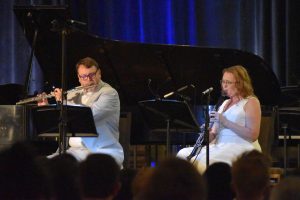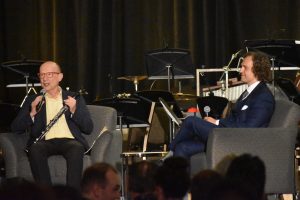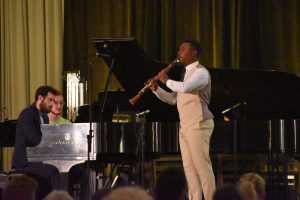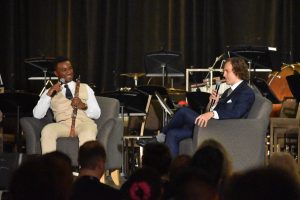
ClarinetFest® 2023 in Review
ClarinetFest® 2023 Day 2
ClarinetFest® @ 5
Mary Alice Druhan, James Campbell & Carlos Ferreira
by Nancy Williams

This new type of recital, one that includes interviews with the performers, was introduced by Artistic Director Wesley Ferreira. Deux-Eaux was first to perform in the Westminster Ballroom. Consisting of Mary Alice Druhan on clarinet and Robert Aughtry on flute, the duo premiered Camaraderie: Three Miniatures for flute and clarinet, composed by Druhan for Aughtry as a retirement gift. The three movements express various times in their long friendship. (The duo is in its 28th year.) The performance was intimate, at times haunting, and at other times lyric and soaring, with each musician displaying tonal depth and mastery of their instruments.
Next was Barbara Heller’s Selbstgespräch (Talking to Yourself). The performers were on opposite ends of the stage, performing seemingly independent lines which grew to intertwine. The meditative quality of the piece offered reprise from the business of the large conference.
After the duo program, which was cut short due to mechanical problems with the clarinet, Ferreira directed Druhan to have a seat in one of the oversized chairs placed on the right side of the stage. The interview was personal, at times humorous, as Druhan talked about her musical journey, which included years of recovery from a disabling injury that significantly limited her playing.
International soloist and recording artist James Campbell was next on the program. Ferreira interviewed Campbell before his performance of the first etude in the Cyrille Rose book 32 Etudes. Campbell regaled the audience with stories of his background, influences, and teachers, at one point stating that school music teachers have the most important jobs in music right now. His performance of the etude was imaginative and inspired. It was a sample of how Campbell had spent his time playing during the pandemic – pretending the etudes were written in a different style or for a different instrument. He instructed the audience to “pretend I’m not playing clarinet; listen to it as a story.” His seemingly effortless performance transcended the challenges of the clarinet to speak directly to the listener.

The recital culminated with Carlos Ferreira, clarinet, and Pedro Emanuel Periera, piano, performing the two last movements of Poulenc’s Sonata. Ferreira’s command of the instrument was exceptional, displaying ease of control throughout registers and volumes, a variety of colors within his tone, and masterful fluidity of technique. The performance was a fresh interpretation including vibrato and rubato as enhancements to the conversation between clarinet and piano. Ferreira’s first performance at a ClarinetFest® will surely not be his last, as the audience expressed its approval loudly and at length. Afterwards, Wesley and Carlos Ferreira discussed their mutual early musical training in the Portuguese tradition that included singing solfege and conducting before study of the clarinet could begin. C. Ferreira shared his experience recording a recent album and his preference for nationalistic music containing paradox.

The diversity of performers reflected this year’s ClarinetFest® theme of global community. The format was engaging, with W. Ferreira occasionally questioning the audience as well as the performer. The power of storytelling impacted the music performances positively through creating a deeper connection between artist and audience.
Comments are closed.